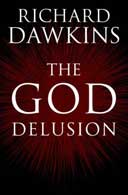 There are times when I feel my anti-religious views tend to the extreme, but then I'll read something by evolutionary biologist Richard Dawkins and I suddenly get the feeling that I'm being downright reasonable. He often reminds me how my own opinions get tempered over time by dominating cultural norms, and how my anti-religious sensibilities are susceptible to the drift of cultural normalization.
There are times when I feel my anti-religious views tend to the extreme, but then I'll read something by evolutionary biologist Richard Dawkins and I suddenly get the feeling that I'm being downright reasonable. He often reminds me how my own opinions get tempered over time by dominating cultural norms, and how my anti-religious sensibilities are susceptible to the drift of cultural normalization.His latest book, The God Delusion, is another wake-up call for all members of secular society who pander to those who decry the need for freedom of religion, when what we should be doing is our darndest to ensure that minds are fostered and raised such that they are free from religion.
Just this morning my son asked me a question about Mary, Jesus and God (he gets this from my ex-wife), and rather than responding with some kind of convoluted answer drawn from Christian mythology, I closed the conversation outright by saying, "Ask your mother, I don't believe in this stuff."
That's a bit harsh, I know -- I'm grumpy in the mornings; I usually deal with these issues with a bit more tack, but ultimately my message to my kids is the same: we can either choose to believe things without foundation, or we can use our capacity for exploration and discovery to prove and know those things that truly exist. Otherwise, we are susceptible to all sorts of strange beliefs. I ask my children, both of whom are under 10 but freakishly bright, do you believe in sasquatch, werewolves, ghosts, UFOs and telekinesis? And if not, why not? I try to convey to them the notion that belief in god falls under the same category of pseudoscience, fairy tails, urban legends, and mythology.
The world is complicated enough for children without feeding them fantastically bizarre stories about gods, demi-gods, heaven and hell. At the same time we as parents are responsible for nurturing a sense of right and wrong behaviour in our children without blackmailing them via the idea that their negative actions will result in reprisals from Beyond. People should act in a moral manner not because an ancient book tells them to, or because of a fear of a delusional God, but because it feels right in both heart and mind.
Indeed, as Richard Dawkins notes in his new book, teaching religion to children borders on abuse. On this point I agree. I can't help but feel that parents who proselytize their children are acting pathetically -- targeting those members of society who cannot yet formulate their own opinions or methodological frameworks that help them make sense of their world and existence. Religion deserves an R rating.
Rather, we as parents should be broadening the minds of our children as much as possible. We need to help our children think for themselves and to think critically. We should teach them that skepticism is both a value and a healthy activity. At the same time however, we need to help kids feel comfortable in exploring all the realms of culture and society that the world has to offer. It is our job and responsibility to provide our children with the requisite tools for free and critical thought.
Parents need to open doors rather than close them. Religions not only close the doors to our rational faculties and our experiential potentials, they often act as the deadbolt that locks the door tight forever.
_________________
Related reading:
Scientific Ignorance Dooms Democracy: Increasingly hi-tech nations need informed citizens, making scientific literacy a human right and scientific illiteracy a disability
Ending Biblical Brainwash: For better mental and cultural health, it's time we classified religious fundamentalism as a psychological disorder
The False Promise of Pseudoscience: Real science offers hope. Mysticism and belief in the paranormal are just plain dangerous

No comments:
Post a Comment